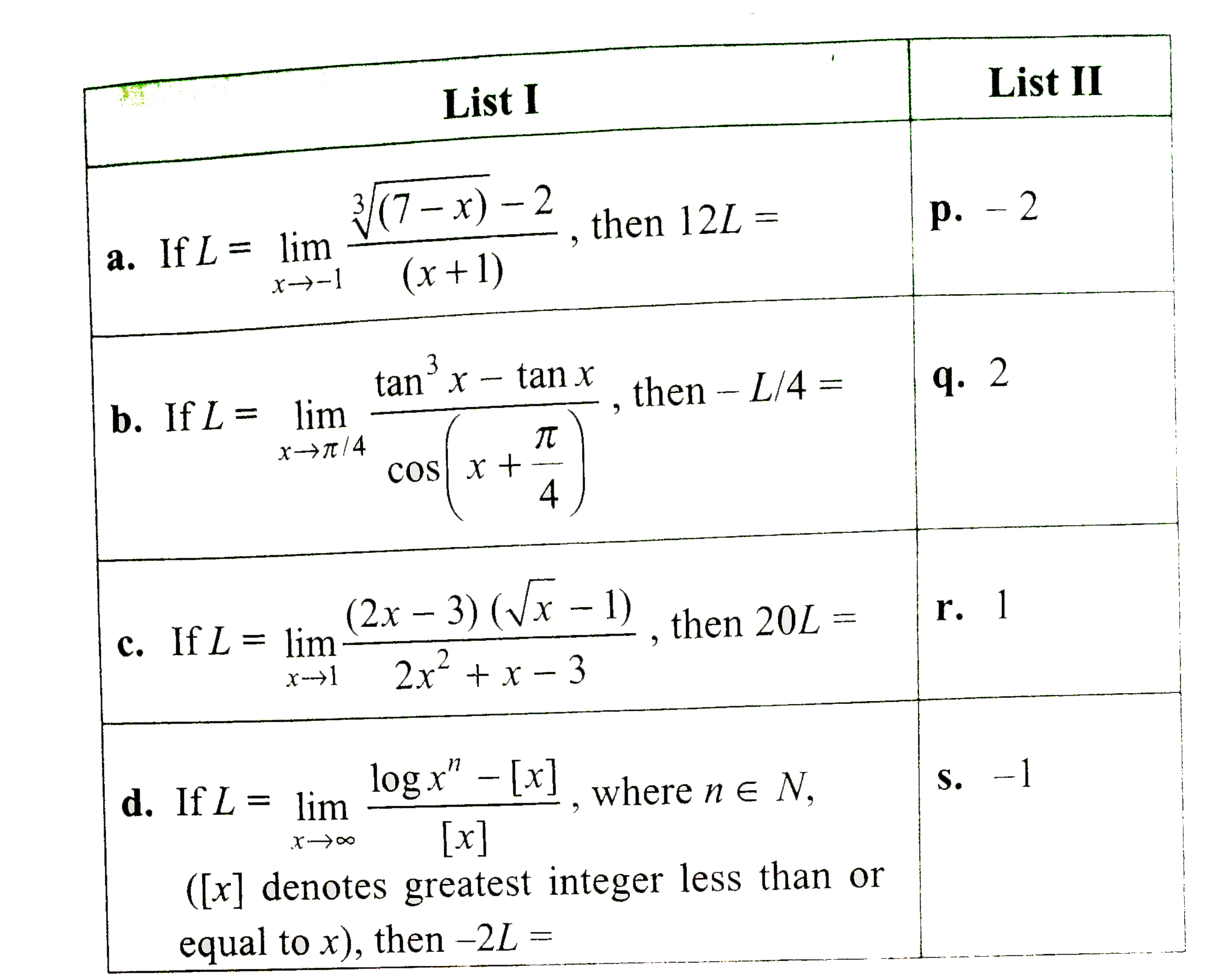The integer n for which limx→0(cosx−1)(cosx−ex)xn is a finite non-zero number is :Solution in Bengali
The correct Answer is:(3)
L=limx→0(cosx−1)(cosx−ex)(1+cosx)xn
=limx→0(sinxx)2(1−cosxx+ex−1x)xn−311+cosx
If L is finite nonzero, then n=3 (as for n=1,2,L=0, and for n=4,L=∞.)
Topper's Solved these Questions
- LIMITSBOOK - CENGAGE PUBLICATIONCHAPTER - LIMITSEXERCISE - Archives JEE MAIN
8 Videos
- LIMITSBOOK - CENGAGE PUBLICATIONCHAPTER - LIMITSEXERCISE - Archives JEE ADVANCED
2 Videos
- LIMITSBOOK - CENGAGE PUBLICATIONCHAPTER - LIMITSEXERCISE - Matrix Match Type
5 Videos
- JEE 2019BOOK - CENGAGE PUBLICATIONCHAPTER - JEE 2019EXERCISE - Chapter 10
8 Videos
- LINEAR COMBINATION OF VECTORS, DEPENDENT AND INDEPENDENT VECTORSBOOK - CENGAGE PUBLICATIONCHAPTER - LINEAR COMBINATION OF VECTORS, DEPENDENT AND INDEPENDENT VECTORSEXERCISE - DPP 1.2
10 Videos
Similar Questions
Let f:R→R be a positive, increasing function with
limx→∞f(3x)f(x)=1. Then limx→∞f(2x)f(x) is equal to
View SolutionIf limx→0[1+xln(1+b2)]1x=2bsin2θ,b>0andθ∈(−π,π]. then the value of θ is
View SolutionMatch the following lists:

View SolutionIf y = y(x) is the solution of the differential equation, xdydx+2y=x2 satisfying y(1) = 1, then y(12) is equal to
View SolutionThe number of integral values of p for which (p+1)ˆi−3ˆj+pˆk,pˆi+(p+1)ˆj−3ˆk and −3ˆi+pˆj+(p+1)ˆk are linearly dependent vectors is q
View SolutionThe integer n for which limx→0(cosx−1)(cosx−ex)xn is a finite non-zero number is :
View SolutionThe integer n for which limx→0(cosx−1)(cosx−ex)xn is finite nonzero number is ________
View SolutionFind the integral value of n for which limx→0cos2x−cosx−excosx+ex−x32xn is a finite nonzero number
View SolutionIf n is a non zero integer and [*] denotes the greatest integer function then lim_(x rarr0)[(n(sin x)/(x)]+lim_(x rarr)[n(tan x)/(x)] equals
View SolutionThe natural number n,for which lim_(x rarr0x rarr0)((27^(x)-9^(x)-3^(x)+1)(cos x-e^(x)))/(x^(2n+1)) is a finite non zero number equal to
View SolutionThe least integer n for which lim_(x to 0) ((cos x - 1) (cos x - e^(x)))/(x^(n)) is a finite non-zero number is
View SolutionThe integer n for which the
limx→0cos2x−cosx−excosx+ex−x32xn is a finite non-zero number is
View Solutionपूर्णांक n, जिसके लिए limx→0(cosx−1)(cosx−ex)x, एक परिमित अशून्य संख्या है :
View Solutionयदि पूर्णांक n के लिए limx→0(cosx−1)(cosx−ex)xn एक परिमित शुनयोत्तर संख्या है, तो n का मान है
View SolutionThe integer 'n' is for which Ltx→0(cosx−1)(cosx−ex)xn is a finite non zero numberis
View SolutionThe integer n for which limx→0(cosx−1)(cosx−ex)xn is a finite non-zero number is :
View Solution
